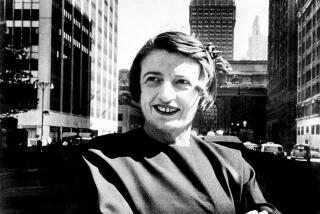‘The Fireman’ may be the best apocalyptic read of the year, if you can stand the heat
- Share via
There is a certain perverse pleasure in imagining the world going down in flames. But what if it was more than a metaphorical conflagration? What if your neighbors, friends, colleagues, or family could ignite without warning, starting a chain reaction that could send entire cities up in smoke? What if this was happening simultaneously all over the world? And what if nobody knew how to stop it? In his new novel, “The Fireman,” Joe Hill drops us in just as everything is starting to go to hell, where nothing and no one is safe.
It’s a page-turner — or perhaps page-burner is more appropriate — full of edge-of-your-seat tension and moral quandaries that simmer.
The fire contagion is a virus, Draco incendia trychophyton, also known as Dragonscale, that infects people and eventually causes them to burst into flame, often taking any nearby infected people with them. Harper, an elementary school nurse, volunteers at the local hospital to help the sick. When the hospital burns down and she too gets infected, her husband, Jakob, blames her desire to do the right thing. Rather than burst into flames, they make a pact to end their lives on their own terms. But Harper discovers she’s pregnant, and that plan goes up in smoke too.
Jakob convinces himself that she’s infected him, and he attacks her. Only the reappearance of a fireman Harper met at the hospital saves her. This fireman doesn’t fight the fire though, he embraces it. Somehow, he has learned to control his infection. Hoping that she can learn the Fireman’s secret to Dragonscale before she immolates or has her baby, Harper sets out into the New England forest with her rescuer. But her story is just getting started. In the ashes and cinder left over from a world reduced to the dead and the waiting to die, Harper finds that she’s never been more alive.
The world of “The Fireman” is close to our own: George Clooney burned up trying to save the planet, and even Google isn’t spared from the flames. The book is full of references to actual celebrities, books, music and movies. Hill uses the world we know and recognize to create a sense of loss; although this risks making the story feel dated, it instead deepens the post-apocalyptic feel and power of the novel. It’s not just that the world is on fire, it’s that the world is on fire and we don’t even have Oprah.
When the Space Needle falls, it’s reminiscent of the 9/11 attacks. Losses like this isolate Harper and the other characters from the world they knew, and that isolation keeps the reader focused on them while also reminding us that there is a whole world on fire outside.
Harper follows the Fireman, learning his name is John Rookwood, to a former summer camp that is a haven for the infected. It has food, shelter, an infirmary — and, instead of igniting, the people there glow with something they call the Bright. Although Harper hopes to have her baby there, the radio brings word of Cremation Crews, vigilante squads who hunt down the infected and execute them, led by a right-wing radio host turned incinerator who calls himself the Marlboro Man. And the camp is running low on food and medical supplies. When misfortune strikes one of the camp’s own, it isn’t long before Harper discovers that Camp Wyndham might be just as dangerous as the outside world.
Much like Cormac McCarthy’s “The Road” and the television series “The Walking Dead,” “The Fireman” reminds us that, no matter what other dangers we think might be out there, other people are always the greatest threat.
While the novel invites comparisons to “The Road,” it also draws heavy inspiration from Stephen King’s “The Stand.” In fact, this is the first of Joe Hill’s works — he’s published three other novels, a short story collection and two comics — where he acknowledges that he’s operating in the same world as King, his father. His use of humor story strongly echoes King’s ability to turn a joke into a terrifying moment, and there are several references to King’s novels. Hill is walking the path blazed in part by his father but is by no means in his shadow. “The Fireman” is a work that stands firmly on its own merits and shows that Hill is a literary force of his own.
One of the most unusual and successful tricks that Hill pulls off is his mysterious narrator. Right at the very beginning, the reader learns that the schools shut down but “would reopen when the crisis passed. As it happened, it never passed.” So from the start, the narrator makes sure that the reader knows that there is no return to normalcy in the last chapter, that hope for a Disney ending is in vain. Throughout the story, the narrator’s asides tell the reader about events that happen just beyond the scope of Harper’s knowledge. Sometimes it’s something she would have seen if she’d just turned her head, or a momentary aside to direct the reader’s attention to a particular point. Other times the narrator clearly knows what is about to happen to one of our beloved characters, and won’t tell us. This underlines the sense of a moral imperative: Someone is telling us this story, there’s a reason why.
And despite being a big book, it has a driving intensity. Asides don’t break the rhythm of the action; they keep a slow burn on the suspense and tension. Questions can only be answered by turning the page.
At the heart of what makes the story work, though, is Harper. Hill’s heroine discovers that the emotional abuse she’s suffered from Jakob has left her broken and flawed, but she still shows compassion and empathy for other characters. She’s weirdly obsessed with Mary Poppins, full of self-doubt and anger that makes her swear just to piss off an obnoxious man, but has grace and dignity. And she spends the majority of the novel pregnant.
This is a story with a lot of meat on its figurative grill. Aside from clocking in at 768 pages, “The Fireman” brings into sharp focus just how far humanity can go to justify certain actions in the name of safety. At its core, the novel asks what it means to be a decent human being, to protect what and who you love, and how far you’re willing to go in that protection. An imperfect world is burning to the ground and those who survive must find what’s worth fighting for in it.
Fromson is a native Angeleno who co-founded and co-hosts the Shades & Shadows reading series.
::
“The Fireman”
Joe Hill
William Morrow: 768 pp., $28.99
More to Read
Sign up for our Book Club newsletter
Get the latest news, events and more from the Los Angeles Times Book Club, and help us get L.A. reading and talking.
You may occasionally receive promotional content from the Los Angeles Times.








